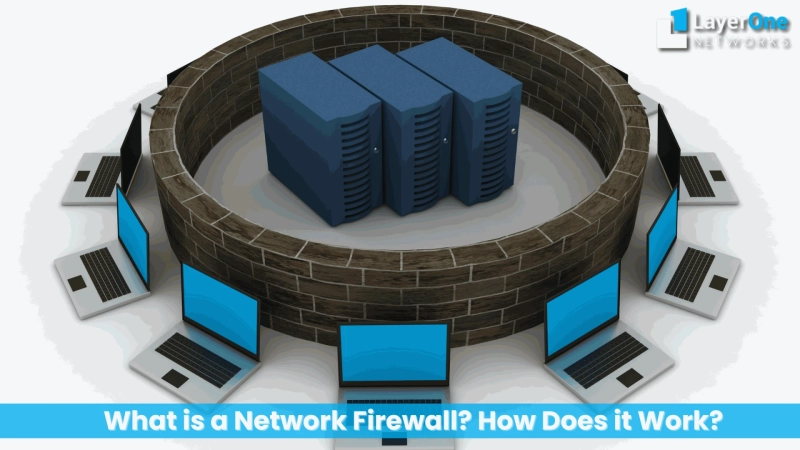In today's complex technological landscape, where the internet plays a central role in how we communicate and share information, ensuring the security of digital assets against online dangers has never been more crucial. Among the defenses employed to shield networks, the network firewall is a steadfast protector, creating a vital barrier between internal systems and external risks. With the help of IT security services, businesses can easily streamline a wide range of robust network security parameters to protect the periphery of systems and organizations from vita cyber attacks.
Safeguarding your data and privacy is essential when you're connected to unknown or recognized networks. Network Security ought to be a top concern in any workplace setting.
This comprehensive guide will provide all the core principles of network firewalls, deciphering their complexities and examining how they work to strengthen digital world.
Basic Overview On: What is a Network Firewall?
Think of a network firewall as a traffic cop for your data highways. It examines each piece of information passing through, checking it against a list of approved and disallowed items. If the data packet meets the safe passage criteria, it can proceed without interference. However, if it raises any red flags or matches items on the "do not allow" list, the firewall blocks its path, preventing potential threats from infiltrating your network.
The firewall acts as a protective shield, safeguarding your digital assets from harm and ensuring that only authorized traffic reaches its destination. Integrating data security services Corpus Christi into the existing network of organizations helps prevent cybersecurity threats from infiltrating the network perimeter.
Network firewalls act as robust defenses, shielding your digital realms from unwanted trespassers. With these protective barriers in place, you can be confident that no malicious software will penetrate your systems. Moreover, leveraging managed cloud services improves the efficiency of these security practices, as proficient IT specialists can seamlessly monitor and manage it, guaranteeing optimal protection around the clock.
Different Types of Firewalls
Packet Filtering Firewall
Packet filtering firewalls work at the OSI model's network layer (Layer 3), where they scrutinize individual data packets according to predefined rules. These rules dictate the examination of details like where the data comes from (source IP address), where it's headed (destination IP address), the ports it uses, and the protocols it follows. The firewall decides whether to allow or block the packet's passage based on these attributes.
Despite their efficiency, packet filtering firewalls have limitations in analyzing packet contents beyond the basic header information. In simpler terms, while they're adept at evaluating the outer packaging of data packets, they need to gain the advanced capability to delve deeper into the actual content of the packets. They might miss potential threats hidden within the data payload, making them less effective against sophisticated cyberattacks.
Stateful Inspection Firewall
Stateful inspection firewalls merge packet filtering functionalities with a sharp understanding of connection status. They help keep track of ongoing connections, creating a log of active data exchanges, which they leverage to make smarter choices about permitting or blocking packet transmission. By analyzing the traffic flow in context, these firewalls bolster security measures by effectively integrating data backup and recovery services into the network perimeter, effectively countering specific attack methods like session hijacking.
Proxy Firewalls
Proxy firewalls, also called application-level gateways, function at the highest layer of the OSI model, which deals directly with applications (Layer 7). Acting as middlemen between users and servers, they examine and scrutinize traffic before it reaches its intended destination. This intermediary role enables them to intercept data packets, thoroughly assess their contents, and decide whether to let them pass.
What sets proxy firewalls apart is their ability to offer precise control over various applications and protocols. It means they can dig deep into the packets using managed cloud services, analyzing their contents in detail, and even applying filters to wipe out undesirable data. Essentially, they serve as seamless inspectors at the application layer, ensuring that only safe and appropriate traffic traverses the network, enhancing overall security.
Next Generation Firewalls (NGFW)
Next-generation firewalls (NGFWs) significantly advance firewall technology, going beyond basic packet filtering and stateful inspection. These advanced systems incorporate sophisticated features, including intrusion prevention systems (IPS), application awareness, user authentication, and advanced threat detection capabilities.
By integrating these functionalities, NGFWs offer organizations improved insight into network traffic and greater control over potential security threats. This enhanced visibility enables more robust protection against complex and evolving cybersecurity risks through IT security services, ensuring the integrity and security of organizational networks.
After understanding the type of firewalls, it becomes essential to know the importance of firewalls for business.
How Does a Firewall Work?
Traffic Filtering
When a data packet arrives, the firewall scrutinizes its characteristics, such as where it came from and where it's going (source and destination IP addresses), the ports it's using, and the protocols it follows.
Using predetermined rules, the firewall then decides whether to allow the packet to pass through, block it entirely, or keep a record of its passage. This meticulous examination ensures that only authorized and safe data flows through the network, contributing to overall security and integrity.
Stateful Inspection
Stateful inspection firewalls record active connections in a state table, which helps them monitor the status of ongoing interactions. When examining incoming packets, these firewalls cross-reference them with existing connections to verify their legitimacy within established sessions through IT security services. This method ensures that only authorized data can pass through the firewall, improving network security by preventing unauthorized access and potential threats from infiltrating the system.
Application Awareness
Next-generation firewalls (NGFWs) boast an advanced capability to recognize and categorize applications and services moving through the network. Through deep packet inspection, these firewalls can thoroughly analyze the content of data packets, enabling them to distinguish between different applications and services regardless of the ports or protocols employed. This increased level of inspection empowers NGFWs to enforce security policies by integrating IT security services based on specific applications, ensuring that only authorized activities are permitted.
In contrast, unauthorized or potentially harmful ones are promptly identified and blocked. Understanding next-generation firewall systems makes it crucial to understand multifactor authentication.
Intrusion Prevention
A common feature found in numerous firewalls is the integration of intrusion prevention systems (IPS), which play a crucial role in identifying and halting malicious activities as they occur. These IPS components closely examine the traffic flowing through the network, scrutinizing its patterns and recognizable signatures linked to previously identified attacks.
Through this analysis, the IPS enhances the firewall's effectiveness by actively detecting and preventing intrusions in real time, acting as an additional layer of defense against potential threats.
IPS functionality significantly strengthens the firewall's capability to safeguard the network from unauthorized access and malicious intent by continuously monitoring traffic and swiftly responding to suspicious behavior.
This proactive approach to threat detection and integration of advanced IT security services enables the firewall to avoid emerging risks by identifying and blocking malicious activities before they can inflict harm.
As a result, organizations can enjoy heightened levels of security, knowing that their firewall equipped with IPS is actively working to protect their digital assets from potential cyber threats.
Virtual Private Network Support (VPN Support)
Firewalls commonly integrate Virtual Private Network (VPN) features, which enable secure remote access and encrypted communication across distant networks. This VPN functionality enables organizations to securely extend their private network over public infrastructure such as the Internet for enhanced data backup and disaster recovery services. It provides a protected pathway for data transmission.
By leveraging VPN capabilities, businesses can facilitate remote connectivity for employees while ensuring that sensitive information remains encrypted and inaccessible to unauthorized parties. Essentially, VPN-enabled firewalls are the gateway for establishing secure connections over public networks, enhancing data privacy and security for geographically dispersed teams and networks.
Get Extra Protection with a Network Firewall That Safeguards Organization Sensitive Data
As advanced technology gets infected by cyber threats and evolving attack practices, network firewalls and IT security services are important in protecting digital assets. By carefully screening and examining network traffic, firewalls play a vital role in safeguarding organizational networks against unauthorized entry and harmful actions. Comprehending the various firewall types and their functions is indispensable for devising a successful cybersecurity plan.
As technology progresses, network firewalls will persist as a crucial element of a robust security framework, guaranteeing the preservation of sensitive data's integrity and confidentiality.
If you own a business that requires a robust network infrastructure and safeguards data through network firewalls. You can contact IT consulting firms that provide customizable solutions according to your business application requirements.



